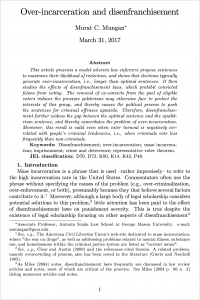Over-Incarceration and Disenfranchisement
Murat C. Mungan, George Mason Law & Economics Research Paper No. 16-43
This article presents a model wherein law enforcers propose sentences to maximize their likelihood of reelection, and shows, according to its author, that elections typically generate over-incarceration (i.e., longer than optimal sentences). The article then studies the effects of disenfranchisement laws, which prohibit convicted felons from voting.
According to the author, the removal of ex-convicts from the pool of eligible voters reduces the pressure politicians may otherwise face to protect the interests of this group, and thereby causes the political process to push the sentences for criminal offenses upwards. Therefore, disenfranchisement further widens the gap between the optimal sentence and the equilibrium sentence, and thereby exacerbates the problem of over-incarceration. Moreover, the author concludes, this result is valid even when voter turnout is negatively correlated with people's criminal tendencies, i.e., when criminals vote less frequently than non-criminals.
